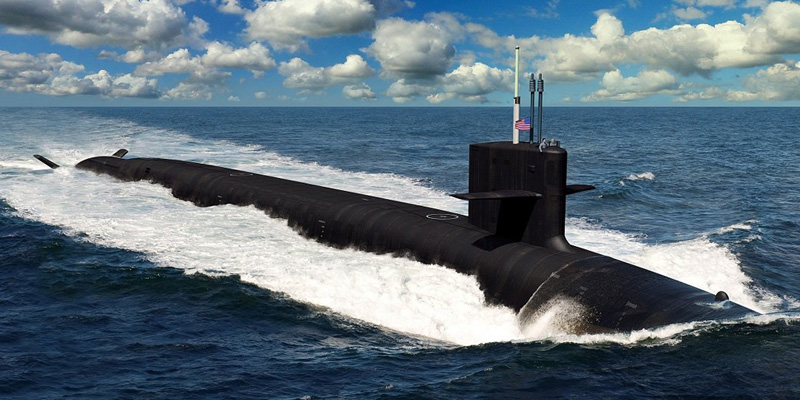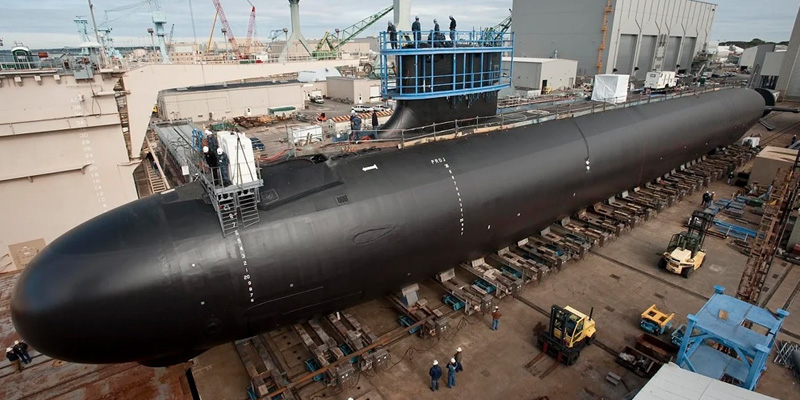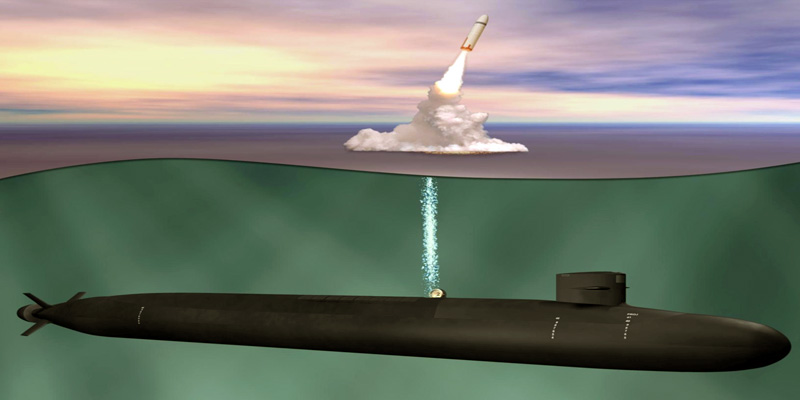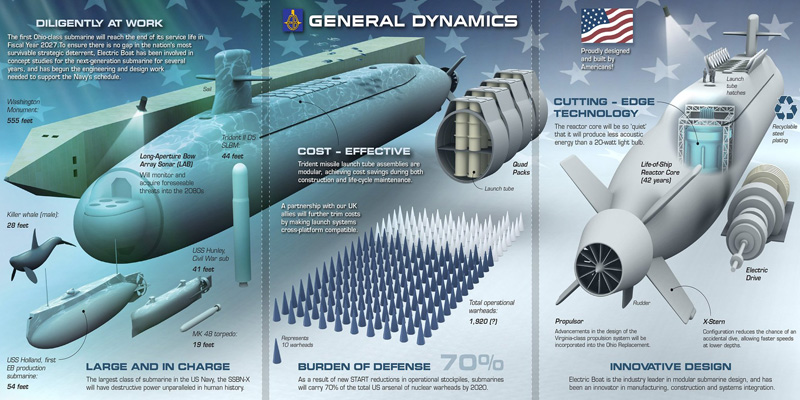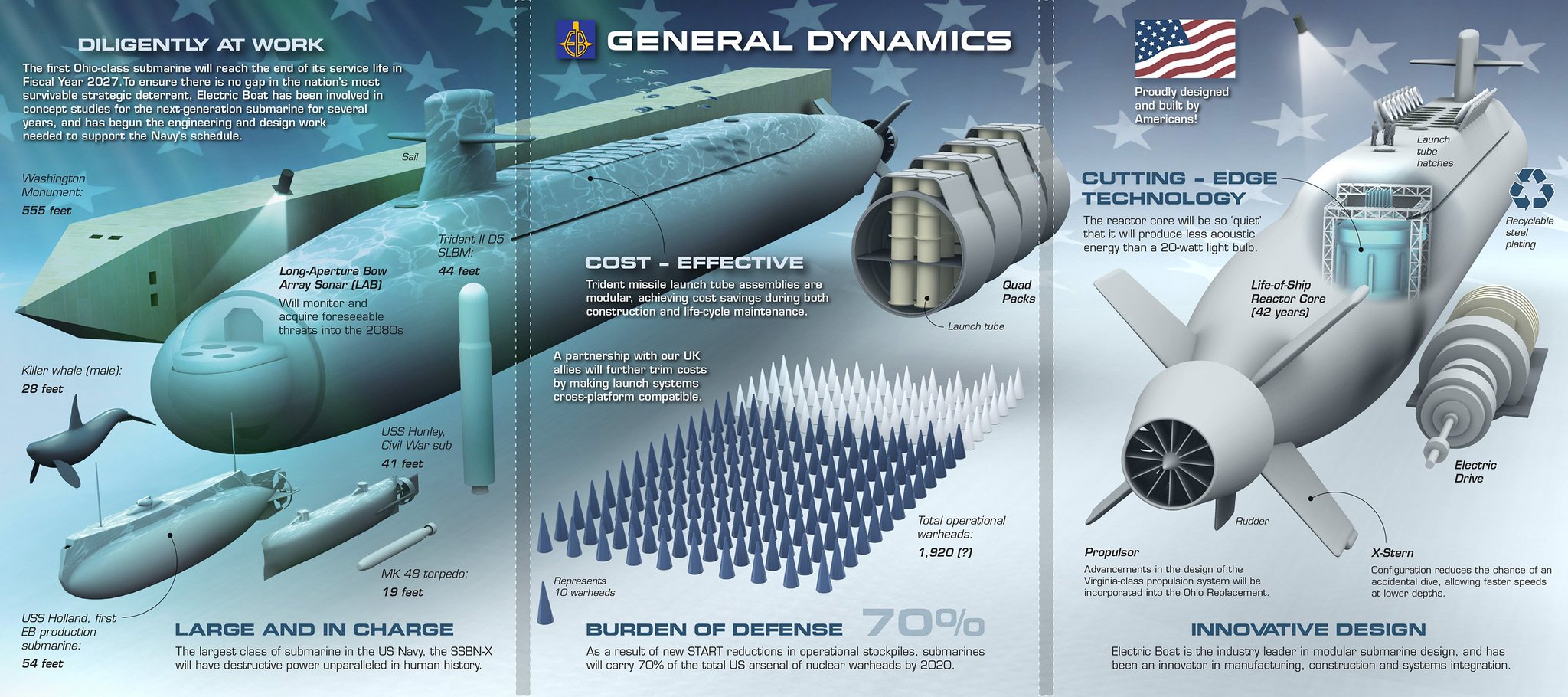Columbia-Class SSBN
The Columbia-class submarine is a new class of
United States Navy nuclear submarine
built to replace the existing Ohio-class SSBNs
Summary
The Columbia-class program's goal is to design and build a class of 12 new ballistic missile submarines (SSBNs) to replace the Navy’s current force of 14 aging Ohio-class SSBNs. The Ohio-class submarines were designed to have a service life of 42 years (two 20-year cycles with a 2-year midlife nuclear refueling period). As the Ohio-class SSBNs were first deployed in 1981, they will start reaching the end of their service between 2027 and 2040, at a rate of about one boat per year. Starting in 2031, the Navy plans to replace each retiring Ohio-class boat with a new Columbia-class SSBN submarine.
The Navy has identified the Columbia-class program as its top priority program, and procured the first Columbia-class boat in 2021. As the Navy’s top priority, the Columbia-class program will remain funded even at the expense of funding other Navy programs.
The Columbia-Class Submarine will be larger than the Ohio-class design in terms of submerged displacement, and therefore will be the largest submarine ever built by the United States. The Navy has also planned the Columbia-class to be fitted with the most "up-to-date capabilities and stealth" to ensure they are survivable throughout their full 40-year life span. Click here for Key Design Features.
Class Name
The Columbia-class program was known as the Ohio Replacement Program (ORP) or SSBN(X) program until 2016. Boats in the class were referred to as Ohio replacement boats or SSBNXs. Some budget documents continue to use these terms.
On January 13, 2025, it was announced by the Secretary of the Navy that the third Columbia-class submarine will be named the USS Groton (SSBN-828).
On June 4, 2022, Rep. Eleanor Holmes Norton (D-D.C.) declared the keel laid for the future USS District of Columbia (SSBN-826). The ceremony marked the ceremonial construction start of the Columbia-class that’s expected to commission in 2027.
On October 28, 2020, it was announced by the Secretary of the Navy that the second Columbia-class submarine will be named the USS Wisconsin (SSBN-827).
On July 28, 2016, it was reported that the first boat in the class will be named Columbia in honor of the District of Columbia. Since then, the program has been referred to as the Columbia Class program, and the boats as Columbia-Class Submarines. The Columbia-class was officially designated on 14 December 2016, by Secretary of the Navy Ray Mabus. The lead submarine will be the USS District of Columbia (SSBN-826).
Budget
The Columbia class submarine is essential in order to maintain the U.S. Naval Submarine force levels. The Navy's FY2025 budget submission estimates the total procurement cost of the 12-ship class at $126.4 billion, an increase of 12.1% over the figure in the FY2024 budget submission of $112.7 billion.
The Navy’s FY2025 budget submission estimates the total cost of the first boat (SSBN-826) at about $15.2 billion, and the cost of the second Columbia-class boat (SSBN-827) at about $9.3 billion. The first boat’s procurement cost is much higher than following boats, as the first boat includes most of the detail design/nonrecurring engineering (DD/NRE) costs for the class.
Cost-reduction studies were made to explore design and construction possibilities, and concluded that the new design would be the least expensive option that could meet all of the technical requirements. While the Columbia class submarine is more expensive than past submarines, they are much more advanced and do offer cost saving features. One major cost savings is that each Columbia-class nuclear fuel core is designed to last as long as the submarine is in service, so there is no 2-year midlife nuclear refueling period as with previous SSBNs. This adds 2 years of service life to each Sub, or 24 years of extra service when you consider all 12 Submarines in the class.
On November 25, 2024, White House Office of Management and Budget asked Congress for an additional $1.59 billion to keep Columbia-class nuclear ballistic missile submarine construction on track during the current stop-gap federal funding bill, which expires in December. The request also includes another $5.69 billion to pay for cost overages on three Virginia-class submarines and workforce development at General Dynamics Electric Boat and HII’s Newport News Shipbuilding.
On December 21, 2022, General Dynamics Electric Boat announced that the U.S. Navy awarded it a $5.1 billion contract modification option for advance procurement and advance construction of critical components and material to support Build II (the next five ships in the class), efforts to support continuous missile tube production, enhancements to develop the Submarine Industrial Base, and sustained class maintenance and support.
On November 05, 2020, General Dynamics Electric Boat announced that the U.S. Navy awarded it a $9.5 billion contract modification option for the completion of USS District of Columbia (SSBN-826), materials for USS Wisconsin (SSBN-827), as well as associated design and engineering support.
In June 2020, the U.S. Navy reached an agreement with General Dynamics Electric Boat, on an $869 million contract modification allowing for continued work on advance construction of Columbia-class submarines as well as a deal on the complete construction of the first two boats of the class. This modification raised the contract value to $9.47 billion.
Delivery Schedule
As the Navy delayed purchase of the first Columbia-class boat from FY2019 until FY2021, there is a new delivery schedule that updates the initial budget estimate. The Navy’s FY2025 budget notes that the lead boat (USS District of Columbia / SSBN-826) will be delivered in October 2027, the second in October 2030 (USS Wisconsin / SSBN-827), the third boat in July 2032, and the fourth boat in July 2033. However, an April 2024 delivery review ordered by Navy Secretary Carlos Del Toro, reportedly states the that SSBN-826 is projected to be between 12 and 16 months late. If this occurs, it would push delivery of SSBN-826 until October 2028 or early 2029, instead of the the planned delivery in Fiscal Year 2027. See latest Columbia-class Delivery Schedule Updates...
Submarine Construction Industrial Base
U.S. Navy submarines are built at two shipyards - General Dynamics Electric Boat Division
(GD/EB) of Groton, CT, and Quonset Point, RI, and Huntington Ingalls Industries Newport
News Shipbuilding Shipbuilding (HII/NNS), of Newport News, VA. GD/EB and HII/NNS are the
only two shipyards in the country capable of building nuclear-powered ships. GD/EB builds
submarines only, while HII/NNS also builds nuclear-powered aircraft carriers and is capable of
building other types of surface ships. The two yards currently are jointly building Virginia-class
attack submarines.
Electric Boat will perform about 78% of the construction of the Columbia class and recently shifted the program to full-scale construction at the company’s manufacturing complex in Quonset Point, Rhode Island. Construction of four of the six 'supermodules' will take place at Electric Boat's Quonset Point facility. The supermodules will then be transported by barge to the company's Final Test and Assembly yard in Groton, Connecticut, where the components will be assembled into a complete submarine in a 200,000 square-foot facility now under construction specifically for the Columbia class. Electric Boat plans to hire up to 18,000 additional workers during the next 10 years for the project. About 2% of the work will be done by HII/NNS in Newport News.
In addition to GD/EB and HII/NNS, the submarine construction industrial base includes scores of supplier firms, as well as laboratories and research facilities, in numerous states. Much of the total material procured from supplier firms for the construction of submarines comes from single or
sole source suppliers.
GD/EB and HII/NNS will build the 12 Columbia-class submarines between 2021 and 2039 with GD/EB as the prime contractor. HII/NNS will participate in the design and will manufacture major Columbia-class assemblies and modules, including the bow, stern, auxiliary machinery room, superstructure and weapons modules.
